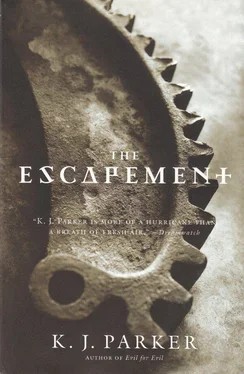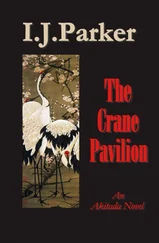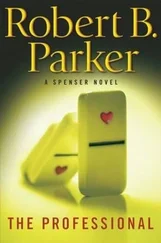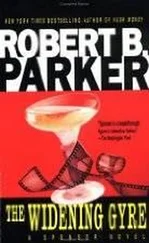K Parker - The Escapement
Здесь есть возможность читать онлайн «K Parker - The Escapement» весь текст электронной книги совершенно бесплатно (целиком полную версию без сокращений). В некоторых случаях можно слушать аудио, скачать через торрент в формате fb2 и присутствует краткое содержание. Жанр: Фэнтези, на английском языке. Описание произведения, (предисловие) а так же отзывы посетителей доступны на портале библиотеки ЛибКат.
- Название:The Escapement
- Автор:
- Жанр:
- Год:неизвестен
- ISBN:нет данных
- Рейтинг книги:4 / 5. Голосов: 1
-
Избранное:Добавить в избранное
- Отзывы:
-
Ваша оценка:
- 80
- 1
- 2
- 3
- 4
- 5
The Escapement: краткое содержание, описание и аннотация
Предлагаем к чтению аннотацию, описание, краткое содержание или предисловие (зависит от того, что написал сам автор книги «The Escapement»). Если вы не нашли необходимую информацию о книге — напишите в комментариях, мы постараемся отыскать её.
The Escapement — читать онлайн бесплатно полную книгу (весь текст) целиком
Ниже представлен текст книги, разбитый по страницам. Система сохранения места последней прочитанной страницы, позволяет с удобством читать онлайн бесплатно книгу «The Escapement», без необходимости каждый раз заново искать на чём Вы остановились. Поставьте закладку, и сможете в любой момент перейти на страницу, на которой закончили чтение.
Интервал:
Закладка:
(The enemy; not something he'd given any thought to. In his mind, they'd been targets, concentric rings of colour with a yellow centre, things that only existed to be shot at; definitely not people, because the one thing you're taught before you get your first bow is, don't point it at anyone. The enemy. The same word, of course, for one man or the whole lot of them, a million savages, they reckoned. Perhaps it was just the confusion inherent in the word, but as he looked at the man with the billhook, there didn't seem to be any difference. He was one man, but he was also all of them: the enemy. The slightest movement, and the enemy will see me.)
The man seemed terribly calm. He was turning his head slowly as though looking for something in particular-me, Linniu thought; he knows I'm here somewhere and he's looking for me-taking his time, unafraid, a man who knew what he was doing. Then, after a very long time, he started to walk, leaning forward to break the suction of the mud around his boots. After a few steps he raised his arm and called out, then carried on, moving steadily away.
Relief made Linniu's head swim. The enemy had been there, but hadn't seen him; and while that had been going on, he'd had a chance to rest. He felt a little stronger, and he'd realised that not getting killed did matter, after all. And all he had to do was get back to the boat.
He looked round, trying to make out its shape, and realised that there was light behind him now-that was how he'd been able to see the enemy-as well as in front. Helpful. Maybe he could see the boat from here. Then it occurred to him that the light was coming from where the boat should be.
The light was the boat. Burning.
And where was everybody, anyway? Suddenly he realised there weren't many people about, which didn't make any sense. He looked at the few he could see. They were the enemy, too.
Oh, he thought.
As soon as he realised what had happened, he accepted it. His side, everybody except him, must all be dead; the battle's over, we've lost, everybody's been killed except me. The explanation was so very easy to believe. It slipped down into his mind without the faintest hint of a struggle, and the only question was, what's going to happen next? He felt quite detached about it, though there was a certain degree of general apprehension. Will they kill me here, or has something else got to happen first? He was prepared to accept it, but it bothered him that he didn't know the procedure.
There had been more than one boat. He hadn't been aware of that before. Somehow, he'd assumed that his barge was the only one, but there were five sources of glowing orange light in the direction of the river. He tried to work out how many men had been on the barge with him: forty, fifty? As many as two hundred and fifty men, then; they couldn't all be dead, could they (apart from him, of course), in such a short space of time? Everything changed, of course; each day on the farm was a slight turn of the wheel, one degree in three hundred and sixty-five. But so much change, so quickly. Then he thought about early summer, when it was time to kill the surplus cock-birds out of the spring hatching. It was always a morning's solid work, forty, forty-five necks to pull, each one a sombre repetition of the last sad panic and desperate, pointless flapping of wings. When it was done, you noticed the change. Stillness in the runs where there'd been movement, silence where there'd been sound. He thought about it some more. It was a job he neither liked nor hated. The grab-jerk-twist was fluent, second nature to him after ten years. He thought of the birds in his hands. They'd crouch still as he held them, wings clamped against the body, their eyes very wide open, until he started the procedure. Then there'd be the panic, every last scrap of the bird's strength applied pointlessly against him, because he was so much bigger and stronger, and that was all there was to it. The struggle did no good. In fact, it was counterproductive; death would come even quicker and easier if they didn't try and thrash about, though it made very little difference, usually. He wondered if he'd struggle when the moment came, and assumed he would. Instinct, after all.
The enemy were moving about; walking slowly and wearily, like men gathering up their tools after they'd finished a job. Every few steps they paused and stooped, examining something on the ground. He realised they were checking the bodies, looking for any of their own, not finding any. He heard the occasional groan, but not often. It was all surprisingly quiet. He guessed the enemy weren't in the mood to talk. Let's get it over with and then maybe we can get some sleep; he'd felt that way often enough at the end of a long day.
The pain was a nuisance, like a dog wanting to play, but not too bad. Maybe pain was only unbearable when you knew it mattered. He felt no need or wish to move, though his knees were starting to ache, and he was profoundly cold. It started to rain, just softly enough to sting his eyes. He tried to think about the difference his absence would make, at the farm, to his family, but it all seemed a bit remote, as if home was something he'd believed in when he was a kid, when he was too young to know better.
The enemy came closer; stopped, looked in his direction, saw him. Coming his way, trudging, worn out by the effort of pulling boots out of deep, sticky mud. He lifted his head to look at him; it was rude to stare, but it couldn't make things worse now, could it? The enemy came a little closer, then paused. He's afraid of me,
Linniu thought, amused; he's afraid I'll bite. He wanted to reassure him, but that would be ridiculous. He heard the enemy call out, and saw another one coming towards him. Oh come on, he thought scornfully, it doesn't need two of you.
He heard the newcomer say something; and, maybe because his voice was higher or clearer, he could make out the words: "Live one here, sergeant." For a moment he wondered what that meant.
A third man came into view. He moved quickly, a man in a hurry, and he didn't seem to be hampered by the mud as much as the other two. As he got nearer, Linniu saw that he had the knack of stepping lightly so as not to sink in so deep; he dug his heels in and hopped. He'd have smiled at the sight, under other circumstances.
The sergeant didn't seem to be afraid of him, at any rate. He came up close, and Linniu was able to make out the general shape of his face: a young man, quite thin, with hollow cheeks and a chin that tapered to a cleft point. He was clean-shaven, and his forehead was splashed with mud. He stopped just out of reach and peered at Linniu like a buyer at market examining a calf.
"He'll do," he said. "Him and three more, take them to the duty officer. If there's any more after that, stick them in the rope store." Quite unexpectedly he grinned wide. "They're all just bloody kids," he said, "that's all they are. And you'll need to get the surgeon to this one, once they've finished with him. There's an arrow sticking out of his shoulder, the poor sod."
Surgeon? He knew what that meant, some kind of doctor. He'd never met a doctor in his life, of course, but he'd heard about them. Once they've finished with him didn't sound too good, but even so… Oddly enough, he felt relieved, if only because here at last was someone who seemed to know what to do, even if he was the enemy.
Then an unpleasant thought struck him. "Excuse me," he heard himself say; at least, he assumed it was him. The voice sounded very small and sad.
The sergeant raised both eyebrows, as if he'd just been spoken to by an animal; animals shouldn't talk, of course, it was unnatural, but he was too intrigued to be angry. "What?"
"The… surgeon." He stumbled over the unfamiliar word. "That's a doctor, isn't it?"
The sergeant was having trouble not laughing. "That's right, son. So what?"
Читать дальшеИнтервал:
Закладка:
Похожие книги на «The Escapement»
Представляем Вашему вниманию похожие книги на «The Escapement» списком для выбора. Мы отобрали схожую по названию и смыслу литературу в надежде предоставить читателям больше вариантов отыскать новые, интересные, ещё непрочитанные произведения.
Обсуждение, отзывы о книге «The Escapement» и просто собственные мнения читателей. Оставьте ваши комментарии, напишите, что Вы думаете о произведении, его смысле или главных героях. Укажите что конкретно понравилось, а что нет, и почему Вы так считаете.












